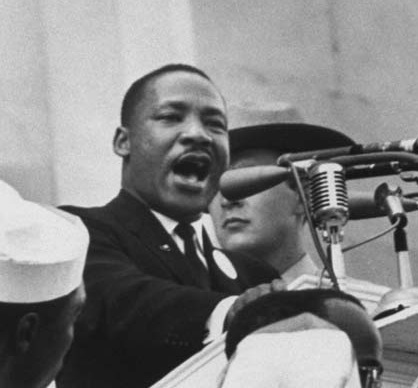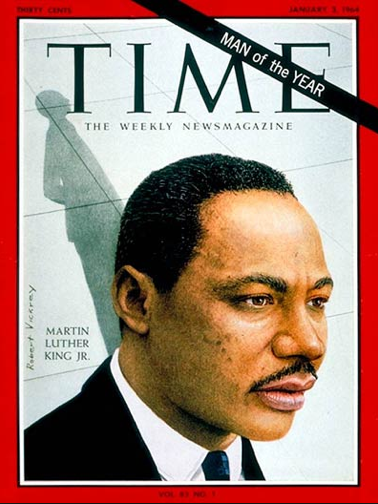Could you say something in a way that will be remembered in 50 years’ time?
More than just remembered, let’s say you’ll have bridges, airports, schools, even a national holiday named after you; that your words will have become part of a national curriculum learned by every child. What you have yet to say will become part of the global consciousness of billions of people.
In this blog and coming installments I want to explore and analyse the continuing power of the twentieth century’s most charismatic individual, the Rev. Dr. Martin Luther King (MLK). His “I have a dream” speech delivered in August 1963 changed political and social reality for all time, and this four-word quote is probably the most cited of any in the English language.
We’re living through the 50th anniversary of King’s speech to 250,000 people in Washington’s National Mall in August 1963, and the upwelling of popular consciousness around it, topped off by US President Barack Obama’s commemorative speech from the self-same place August 27th 2013. This blog suggests a way that you can become involved, contributing your own view in a way that widens understanding. Read on to find out how.
To celebrate this anniversary, the black and white film clips have rolled again and again on news channels around the world. Robert Redford’s fine PBS documentary The March, narrated by Denzel Washington, gives us the context, and multiple approaches to the making of history.
But the true sources of Dr King’s power remain hidden. Even, it must be said, to a man who yearns so deeply to inherit his mantle, President Barack Obama. By daring to take the tribune to address a crowd in the self-same place 50 years later and deliver a profound, well-crafted tribute to the men and women who marched to Washington in 1963, Obama revealed more about himself than he did about Dr King.
“Because they marched, America became more free and fair,” said Obama. And, said America’s first black president – explicitly linking his own fortunes to the changes set in motion by King’s speech – “eventually the White House changed.” The US president is a mighty rhetorician, a powerful storyteller, a compelling speaker – but he has not yet changed history.
So what exactly is the quality that Dr King possessed? Commentators have pondered the mystery of Dr King’s power to change group consciousness, and the techniques he used on that blistering hot day.
In a fine piece published in the New York Times, literary critic Michiko Kakutani, asks the right question: “Why does Dr King’s speech exert such a potent hold over people around the world?” She probes, but like other commentators, has not fully identified the source of King’s magic:
– Was it the power of rhetoric, of presenting arguments honed through long years of pounding pulpits, and sharpened by a trained theologian’s deep knowledge of the rolling cadences of the King James English bible and its book of Exodus?
– Was it a knowledge of the poetic cadences of Shakespeare, blended with the music of African-American spirituals and top-dressed dust-bowl songs of protest from the 1930s’?
– Was it the moral indignation based on a shared, inherited experience of injustice?
– Was it King’s fluency – a skill shared with jazz musicians – of exploring a single theme through improvisation, riff, repetition and resolution?
– Was it the fact that, just as Abraham Lincoln “rebooted” American’s understanding of the Declaration of Independence in his Gettysburg Address, so King did exactly the same thing with ‘I have a dream’ in 1963.
– Was it the fact that King – in response from urgings from the crowd to “tell them about the dream” – abandoned his fixed text and began to improvise?
Yes, it was all these things. but something much more important too. MLK was using the leadership style we call Charisma. Charisma is one of the most powerful, yet least understood of life’s success factors. And it’s for everyone.
We define Charisma as a leadership attribute. It’s the ability to create strong emotional bonds with new and existing followers, and the power of lowering the barriers to disbelief by communicating a vision of the future that’s engaging and compelling.
MLK’s magic rested on his invitation to followers to believe in what (in 1963) seemed an improbably challenging future: “I have a dream my four little children will one day live in a nation where they will not be judged by the colour of their skin.”
For decades, academics and historians have picking around MLK’s undoubted charisma. Say the authors of the Stanford University Dr Martin Luther King Papers Project: “King undoubtedly recognized that charisma was one of many leadership qualities at his disposal.”
For those who still cling to the centuries-old idea that Charisma is something God-given, mysterious, and only for saints, kings or celebrities but not for you or me; we’d invite you to think again.
Until now, we believe that nobody had truly analysed the workings of Charisma. We have found a way to map and measure Charisma, and to identify the sources of the power individuals use to influence the thinking and behaviour of others by force of their personality.
Communicate Charisma is a tool everyone can use.
And one of the best ways to validate its accuracy and effectiveness is to see how the “Wisdom of Crowds” builds the Charisma profile of Great Communicators such as MLK. The more people complete the survey, the more accurate it will become as a popular view of a Great Communicator! Communicate Charisma is committed to building deeper and ever-more coherent pictures of how famous figures are experienced in the public consciousness.
On the Communicate Charisma website we ask visitors to contribute to MLK’s Charisma profile by answering three simple questions. Each question is answered by selecting ten words that best describe a perspective of this Great Communicator.
On the Communicate Charisma website you can make your assessment of Martin Luther King as your Great Communicator, without having to register or submit a personal self assessment. All you have to do is follow this link. Of course, you may wish to find out more about yourself too. In which case, all you need to do is follow this link to register. At the start of your own self-assessment, you’ll be invited to do another Great Communicator test as a warm-up exercise. Perhaps you have a second person you admire!
And once you’re done, you can go on to take the test for yourself — and receive and instant summary profile that identifies the sources of your own Charisma.
Communicate Charisma has already developed a profile of MLK (and of other public names including Barack Obama, Steve Jobs, Bill Clinton, and Nelson Mandela, to name a few). But the more people take the survey, the more complete it will become!
Also, at the http://www.communicatecharisma.com website you can find the follow-up to this article, in which we show the results and dig down to reveal exactly why MLK was so powerful and charismatic a speaker.
Richard House






